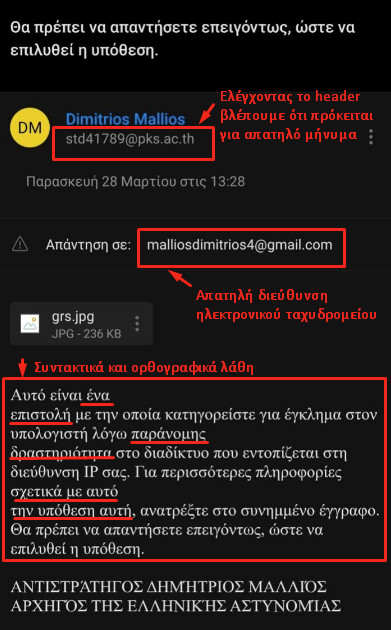ELAS: Announcement for deceit with misleading e-mail-what to watch for people

Citizens’ attention is drawn to the police regarding e-mail misleading messages, allegedly sent by the Greek Police Chief, inviting the recipients to be held accountable for false involvement in illegal acts on the internet.
This message comes to be added to a number of others with similar content, such as the recently contained letter from Minister Niki Kerameos.
The appearance of the name of the e-mail, the sender’s control, as well as the identification of spelling-syntactic errors, contribute significantly to the recognition of such deceitful.
Police announcement for misleading e-mail
Another delusional email was found to be released as a alleged letter by Greek Police Chief Lieutenant General Dimitrios Malliou, who invites his recipients to « explain » for allegedly involved in illegal acts on the internet.
This message comes to be added to a number of others with similar content, such as the recently contained letter from Minister Niki Kerameos and ELAS Chief, presenting little differences, mainly in terms of e -mail addresses and details of the alleged sender.
In this context, citizens are invited to be particularly careful when they receive such, obviously, false messages and to delete them, as they may be particularly harmful to their devices or even lead to their financial deception.
How are deceitful/harmful emails recognized?
To protect against such scams, citizens can take the following actions:
- Display of the E-mail header: to use the header of the email they use, as they contain important information about the sender, the recipient and the route following the message via various servers.
- Checking Message: Carefully check the address of the sender and search for any unusual elements, such as incorrect names or strange endings. For example, in this case the address of the sender is std41789@pks.ac.th, which obviously shows that this is a delusional message.
- Syntactic and Spelling Errors: Fragile messages often contain grammatical or syntactic errors that reveal their fake.
- Attached files and links: Do not open attachments or links from unknown or suspicious sources, as they may contain malware.
- Requests for Personal Data: The Greek Police and other state agencies will never request by e-mail personal data or information.
- Information of information: In case of doubt, communicate directly with the official authorities to confirm the validity of the message.
More information and tips on cases of electronic deception is available on the website of the Cybercrime Prosecution Directorate www.cybelert.gr.
Below is one of the e -mail messages with which deceitful letters are traded. Careful check before the attached file is opened is critical to avoid deception!
In collaboration with everyone, we can prevent online scams and protect our personal data.
Example of misleading e-mail published by police.






